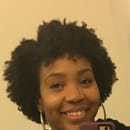The term Blackfishing is a play on the word catfishing. Catfishing is when you pretend to be someone else online. So, blackfishing is pretending to be a black person online. As odd as this sounds, this is a real thing. The act of blackfishing goes a bit further than your average cultural appropriation. It is when white women drastically darken their skin using makeup or fake tans and alter their facial features using makeup to resemble a black woman. Instagram models like Emma Hallberg and Aga Brzostowska are two of the many other white women to be called out on Twitter in November for doing this. They’ve attributed their darkened skin tones to tanning in the sun.
Yes, white people tan like many other races and get darker naturally by the sun. However, there’s a huge difference between someone’s skin darkening because of the sun and someone purposely putting on foundation that is three times darker than their actual skin tone to portray a light skinned black women online.
The current body types that are very popular in pop culture, big boobs and big butts, are features genetically common amongst black women (no, not every black woman has a big butt and big boobs). The women engaging in blackfishing not only have darkened skin, but also have the curly hair, wide hips and large breasts commonly associated with black women to match. That seems like a bit more than a genetic coincidence to me.
To make matters worse, these white models participating in blackfishing also profit off of their unnaturally darkened skin on Instagram. Black women/models get overlooked and passed on for endorsements in favor of white women who aren’t actually black but appear to be. Being black is beautiful, empowering and unique, but it isn’t easy. From being judged by other races because of our hair or the way some of us speak, our dance trends, our clothing, etc. black women have always had to defend their culture and appearance against the masses. So, to see white women profiting off of looking black without having to deal with the struggles of actually being a black woman is ridiculous and offensive whether they’ve actually claimed to be black or not.
Blackfishing is just an extreme form of cultural appropriation. When I take a look at pop culture I see how much black culture or stereotypical black culture influences it. For example, why is it funny when the “catch me outside girl” also known as Danielle Bregoli/Bhad Bhabie, talks with a heavy urban accent but, when a black girl does it, its tacky and ghetto? Or why is it sometimes considered unprofessional and ratchet when a black girl wears her hair in braids but when the Kardashians do it, it’s the next big hair trend?
Overall what myself and other members of the black community are saying is that things like blackfishing are problematic and are incredibly offensive because black women are often bashed if they look or behave a certain way, but if a white woman does the exact same thing they’re praised for it. When black women speak up on these matters, they’re often unfairly called angry, jealous and bitter.This blackfishing phenomenon is not just skin deep, its offensive on a much deeper level. It needs to be stop and there is nothing cute about it. A black woman’s hair, skin color, etc. is not a trend and not something to be used to get likes on Instagram.


